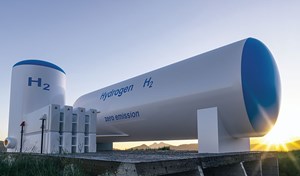Leaked draft of hydrogen production tax credits may “stifle” emerging industry, advocates warn
(Bloomberg) – A leaked draft of Treasury Department guidance for claiming hydrogen production tax credits under President Joe Biden’s climate law is drawing warnings from advocates that the requirements may stifle the burgeoning industry before it takes shape.
The drafted blueprint includes requirements sought by some environmentalists that would limit the $3-per-kilogram credit to hydrogen-production operations powered by wind, solar or other clean-power projects built within the last three years, according to people familiar with the plan. Some of the details of the tax guidelines were reported earlier by Politico.
“If true, the Biden administration’s proposed strategy for implementing these provisions will fail to get this new industry off the ground,” Jason Grumet, chief executive officer of the Washington-based American Clean Power Association, said in a statement Monday. “It is surprising and disappointing that the administration would propose such a rigid approach that is at odds with decades of learning about new technology deployment.”
The guidance in the Treasury Department draft also calls for hydrogen projects to be supplied with new, clean-power sources operating on the same grid on an annual basis through 2027, then on an hourly basis starting in 2028, the people said.
The Treasury Department, which is expected to make its guidance public by year’s end, declined to comment.
The issue has sparked an intense lobbying battle and deliberations across the Biden administration that have slowed the release of guidance, with White House senior clean energy adviser John Podesta helping referee debates between the Department of Energy and the Treasury Department.
“The rigor that is going into this — the good, healthy differences of opinion between Treasury and DOE in coming at an issue and having that be arbitrated — is incredibly robust and helpful to the overall solution, all informed by different perspectives,” Deputy Energy Secretary David Turk said in a U.S. Chamber of Commerce event at the COP28 climate summit in Dubai. With “up to $3 per kilogram for the cleanest of hydrogen, that is a big tax incentive — a big tax credit — and we’ve got to get that right.”
Creates rift. The issue also has created rifts among hydrogen developers. Earlier this month, Synergetic, a green-hydrogen developer, resigned from the American Clean Power Association over its recommendations for the tax credits. The company’s chief executive officer, Mike Sloan, said in an email the trade group’s suggestions would “favor dirty hydrogen over clean hydrogen.”
Looser rules could actually encourage the purchase of low-tech electrolyzers from China, instead of more sophisticated equipment made in the U.S., said Paul Wilkins, a vice president with Electric Hydrogen Co., a privately held maker of electrolyzers, which use electricity to split water into hydrogen and oxygen.
“If you go with dumb rules, you are going to incentivize dumb production,” said Wilkins. “If what’s leaked is indeed accurate, then I think the administration hit the rational middle. Nobody was going to be completely happy.”



